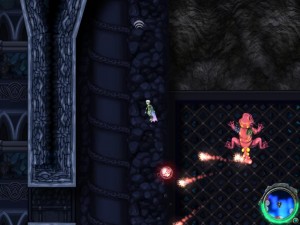Aquaria
 A few years back, Aquaria made a big enough splash in the indie games scene for me to hear it. The demo seemed interesting enough to be worth getting, but I was already on the Oath at that point, and didn’t get around to buying it until it was included in the Humble Indie Bundle. And even then, it was bundled with enough stuff that I didn’t get around to playing it until today.
A few years back, Aquaria made a big enough splash in the indie games scene for me to hear it. The demo seemed interesting enough to be worth getting, but I was already on the Oath at that point, and didn’t get around to buying it until it was included in the Humble Indie Bundle. And even then, it was bundled with enough stuff that I didn’t get around to playing it until today.
Set in a system of undersea caverns, the game gives you control of a mysterious not-quite-a-mermaid named Naija, possibly the last of her kind. Regardless of whether she is or not, she starts off as ignorant of her situation as the player. There are ruined temples and the like within spitting distance of her home, but she apparently hasn’t explored them, which is probably wise, considering the hostile marine life out there. Her uninquisitiveness ends with the player’s involvement, of course: exploration is more or less the point of the game, at least in the early stages. By exploring, you discover skills (in the form of songs) that allow you to bypass types of obstacle, and thereby explore further, sometimes backtracking to open up passageways in areas you left behind. For the first hour or two, it seems like that’s all there is to the game, because you have no way of attacking stuff (apart from the minuscule damage you can do by dropping rocks on them, and even that requires you to first learn how to lift rocks by singing). And honestly, that would be plenty for a certain flavor of game. But you do gain offensive capability after a while, and there are boss fights.
In short, it’s pretty much a Metroidvania, except for one thing: it’s not a platformer. It’s a vertical 2D scrolling environment, but you don’t jump and fall. You just swim freely. In a way, the game’s closest cousin is Ecco the Dolphin.
 Comments(3)
Comments(3)
What ended my time with the game was that the first boss fight occurs prior to you receiving any offensive capability.
If you’re talking about the big nautilus, that isn’t really the “first boss fight”. It’s an optional side-boss that nets you a certain bonus item if you win. The game just gives you enough freedom that you can try to engage it before you’re actually ready, which isn’t unusual in Metroidvanias.
It’s been awhile since I’ve played this, but it’s also the case that the nautilus fight can actually be fled from – while most mandatory boss fights will lock you in, the optional ones will tend to let you run away even if you’re guaranteed to be fully prepared.
I liked Aquaria a lot; I’ll be interested in your comments on the later portions of the game.